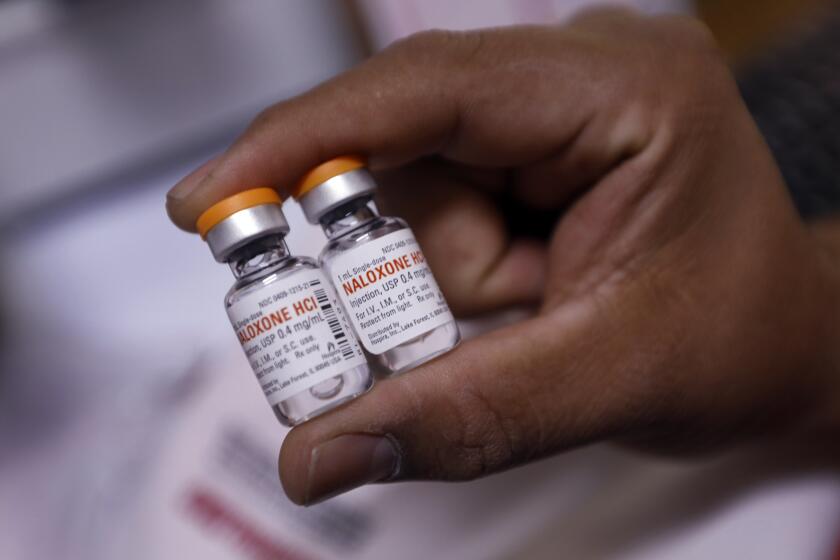A jittery public adds to responders’ load
Someone calls 911 to make a bomb threat, prompting the evacuation of a local TV station as police race to the scene. It turns out to be a hoax.
Someone sees a package that they think is a bomb, temporarily shuttering a local city hall over terrorism fears. It’s a fake.
Yet another “suspicious package” is found, this time an abandoned backpack in Orange County.
“We found the rightful owner,” says a police spokesman, just “before needing to do a controlled explosion.”
The Boston Marathon bombings have left police stretched thin as they are forced to deal with troubling consequences: a surge in bomb squad calls from people who think they’ve spotted an explosive and an uptick in fake threats from people seeking attention during a time of fear and frayed nerves.
“We’re getting three- or fourfold the number of bomb squad calls we usually do,” said Jim Amormino, spokesman for the Orange County Sheriff’s Department. The L.A. County Sheriff’s Department has seen a similar increase.
Officials at the Los Angeles Police Department said that since the deadly attack in Boston on April 15, their bomb squad has been getting five to seven calls a day, a significant increase. Often, days and sometimes weeks can go by without a single call. As happened in the weeks following the attacks of Sept. 11, 2001, Boston’s carnage appears to have spurred, at least temporarily, a public shift.
“Any time someone leaves a bag alone for a few minutes it draws people’s attention now,” said Amormino, who noted that bomb squads are erring on the side of caution, heading to the scene of every call.
LAPD Lt. Andy Neiman said police face a balancing act. “We encourage people to continue to be alert ... [but] we would ask that people do a little investigation on their own to make certain the item doesn’t belong to a neighbor, co-worker or fellow student prior to summoning police.”
Neiman noted that hoax calls contribute to additional demands on critical police resources. “False 911 calls deplete emergency resources to sometimes dangerous levels.... It contributes to the challenges for first-responders when the public is already on edge.”
Those challenges were in full view last week when Orange County’s bomb squad pulled into the parking area of a Del Taco restaurant in Fullerton. Someone had spotted what looked like a pressure cooker bomb similar to the ones used in Boston. “It was one of the more elaborate hoaxes,” said Orange County sheriff’s Sgt. Randy Sterett, noting the device even had wires attached to it. “There was no doubt to us what it was meant to look like with it a being similar pressure cooker ... and then a short distance away was another device [also] made to look like a bomb.”
Police evacuated several Fullerton streets before determining that the devices were harmless hoaxes.
Sterett said investigators are looking into whether the Fullerton case may be connected to a similar-looking pressure cooker device found last week in the parking lot of a Silver Lake grocery store. Police continue to also investigate other hoaxes that occurred over the last week, trying to track down who was behind the call that spurred the evacuation of television station KTLA and the source of a suspicious envelope found Monday at Huntington Beach City Hall. The envelope turned out to be harmless, containing a large amount of what appeared to be sand, police said Monday afternoon.
James Alan Fox, a prominent criminologist at Boston’s Northeastern University, said the uptick in hoaxes and reports of suspicious activity fits into a pattern seen after high-profile mass violence.
“It makes sense. People of course are more skittish, more aware, after something like Boston,” said Fox, who underscored that there are good reasons for the extra awareness. First, he said, nobody has disproved the notion that the brothers suspected of planting the Boston bombs may have been part of a broader scheme to wreak havoc. Second, fears of a copy-cat attack by someone seeking attention are grounded in reality. “Copy-catting,” Fox said, “that’s a legitimate fear, the idea of this being like a contagion.”
The criminologist, who happened to be a few blocks away when the bombs in Boston detonated, said the extra awareness also works to boost the number of prank calls. “These are coming from people who want to be part of the excitement out there,” he said. “They are like a lot of fire starters. They’re not trying to hurt people. They’re often young and immature and just looking for what they see as a thrill.”
--
andrew.blankstein@latimes.com
kurt.streeter@latimes.com
More to Read
Start your day right
Sign up for Essential California for news, features and recommendations from the L.A. Times and beyond in your inbox six days a week.
You may occasionally receive promotional content from the Los Angeles Times.







